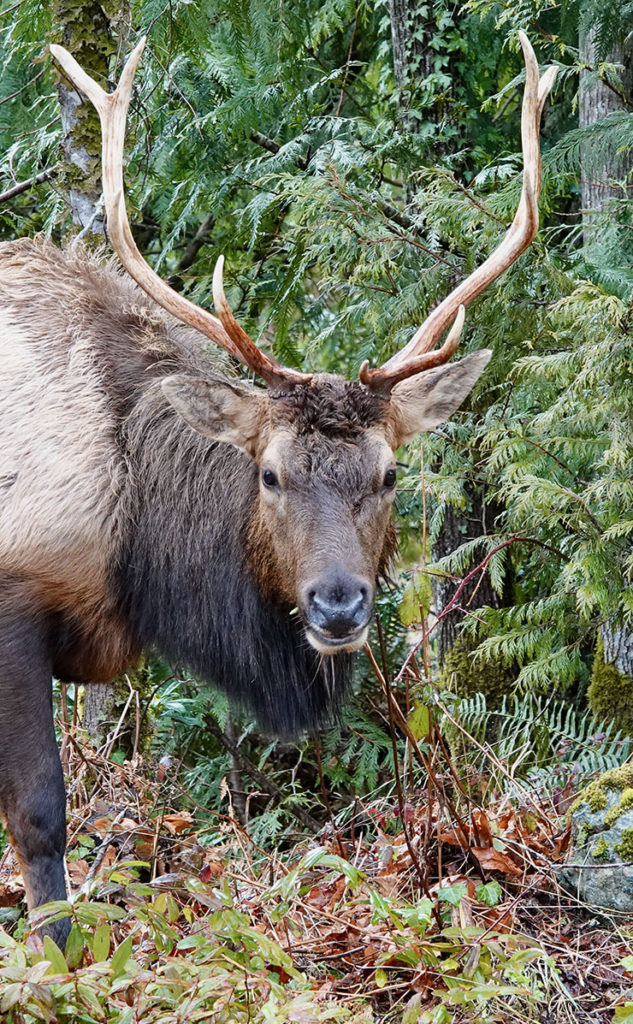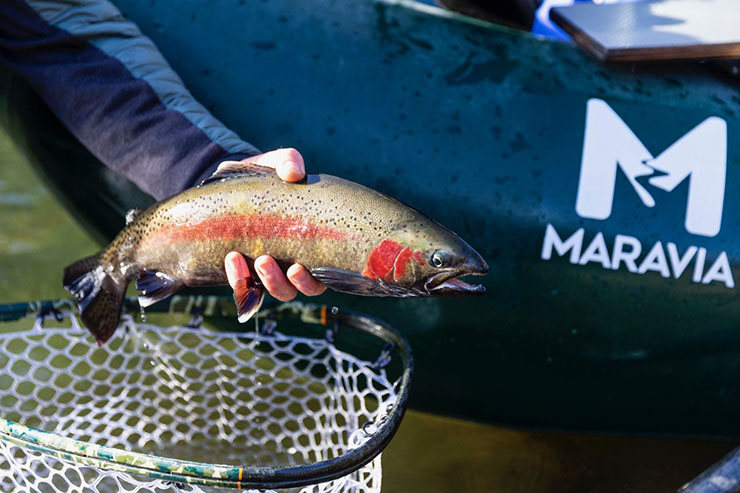Words + Photography: Suzanne Morphet
I might have walked into a John Constable landscape from the early 19th century.
Clouds billow up a mountainside that’s dusted with fresh snow. In the foreground, a pond reflects the sky and surrounding forest in a watery blur of red, green and yellow. Beyond the pond, a river rushes past, eager to reach the sea.
But this is no painting.
It’s the utterly enchanting view from our balcony at the Cowichan River Lodge, located in the Cowichan River Valley, close to Duncan on Vancouver Island.
My husband and I have escaped here for the weekend with two thoughts in mind—wine and wildlife.

While the valley has been making a name for itself as a cool-weather wine region for the last 20 years, wildlife is also commanding more attention.
Take, for instance, the gregarious elk that moved into
Youbou in the last decade, grazing people’s gardens and peering in windows. Locals even gave five of the bull elk names. They’re Bob, Henry, Dennis, Howard and Mr. Hollywood.
Over on the marine side of the valley, hundreds of fat and frisky sea lions have been stopping in Cowichan Bay every fall recently on their annual migration from Alaska to California, flopping on docks and swamping boats.
And of course, the Cowichan River is famous for its fish. Chinook, coho and chum salmon share this 47-kilometre stretch of running water with steelhead, trout and more.
Experienced fly fishers like fourth-generation fisherman Tristan O’Brian rave about it.
“I’ve been up and down the island, explored a lot of remote rivers and never have I seen a river that supports the amount of life this river does,” Tristan tells us as we float down the river from Lake Cowichan in his fishing raft on our first morning.
In spring, the river runs high and fast. We drift past half a dozen boats with fishers, mostly men, standing and casting lines. Passing over a shallow stretch, Tristan points out a couple of sleek rainbow trout.
“The salmon provide the trout with an unreal amount of nutrients,” he says, explaining that any salmon eggs that don’t hatch get scooped up by the trout.
Landing back at the Cowichan River Lodge, we meet up with lodge manager John Chilton.
With 16 riverfront acres, the lodge gets plenty of four-legged visitors. John shows me pictures of bear, cougar and elk, all captured by a motion-activated camera.

Fresh elk dung litters the lawn.
“About two years ago we had a young bull elk,” he explains, “and I thought he was a loser. He didn’t have any horn or anything. But then he left and came back with all these girls!”
Walking around the pond, John points out a beaver dam dug into the bank. The beavers aren’t usually around during the day, but occasionally a group of river otters will show up and then, “all hell breaks loose,” he chuckles. “They scream at each other!”
Driving to Youbou, we see signs warning about elk. Before long, we spot three bulls grazing in front of a trailer park. With their slender legs, big eyes and reddish racks, Tom, Dick and Harry— or whatever they’re called—are impressive, but look hilariously out of place.
The next morning big, fat snowflakes swirl outside while we read by the fireplace. It’s hard to leave this lodge, but we’ve got a date with the winemaker at Averill Creek Vineyard down the road.
“I do as little as I can,” Brent Rowland tells us when we arrive for our tour and tasting. “If you had to put a list of ingredients on a bottle, mine would say ‘grapes’ and that’s it.”
That means no nutrients, enzymes, yeast, sulfites or any of the other “aids” that many conventional winemakers rely on. “It’s much harder to make wines this way,” he says as we sample a fragrant young pinot noir from the barrel, but “a lot more pure and honest.”
Since arriving at Averill Creek in 2018, Brent’s been figuring out what works—“pinot noir is king”—and what doesn’t, such as Marechal Foch.
“I just took a chainsaw to the Foch and grafted on pinot noir,” he adds.
Sitting in the lounge and looking over this big valley from the sunny side of Mount Prevost, we realize some things in life really are that simple.
Coming to Cowichan for a weekend is one of them.

If you go:
thecowichanriverlodge.com
averillcreek.ca
see.
The five resident bull elks in Youbou are just that—resident year-round. They often walk down the highway through town but can be difficult to spot if they’re resting in someone’s garden. Sunrise and sunset are the best times to see bigger herds including females and calves. “You might see five or 35,” the waitress at Cassy’s Coffee House told us when we stopped to inquire. Even the resident bulls are wild animals, so keep your distance.

do.
Fly fishing is experiencing its biggest surge in popularity since A River Runs Through It was released in 1992. Guide Tristan O’Brian says young people are really getting into it, as well as more women. The Cowichan River Lodge can organize a guided fishing tour for you. For a different wildlife experience, take a Hawk Walk at The Raptors in Duncan. Hawks and other birds of prey fly overhead and you might get the thrill of a hawk landing on your gloved hand.
pnwraptors.com

eat.
Breakfasts at the Cowichan River Lodge are filling and delicious with locally sourced ingredients such as sausage from Cure in Cobble Hill, yogurt from the Cowichan Milk Company and coffee from Drumroaster. Farm Table Inn, near Skutz Falls, is a great choice for dinner, serving locally raised beef and their own pork. We enjoyed their West Coast bouillabaisse and Jäger pork schnitzel, paired with local wines. Averill Creek Vineyards has recently introduced charcuterie boards that include locally made spreads and pates from Pickles’ Pantry and island-made cheeses.

sleep.
The Cowichan River Lodge is a beautiful log structure with big picture windows, four comfortable guest rooms and peaceful natural surroundings. Built originally as a fishing lodge, it now caters to a wide variety of guests looking for rest and recreation, on the river and off. Hosts John and Danielle can help you plan activities from hiking and biking to wine tasting and whale watching.



 How sweet it is
How sweet it is